U. project documents RI anti-racism protests
team is continuing to develop the project further, according to project members.
 BY YAEL SARIG SENIOR STAFF WRITER
BY YAEL SARIG SENIOR STAFF WRITER
Eyes glued to various screens for hours; sky-high stress levels; little sleep.
While the scene is familiar — visit any University library amid exams — the cause of anxiety last Tuesday night was something else. Midterm election results were slowly trickling in, and voters watched as the shape of the gov ernment for the next several years took form before their eyes.
To many, the midterm results were a shock in light of expectations of a “red wave” for Republican candidates. This year’s results were relatively unusual, given that the incumbent party usually performs poorly in the midterms: Not only did Democrats retain control of the U.S. Senate, they also lost far fewer seats in the House of Representatives than many political experts had predicted.
As of press time, the Republican Party was on the cusp of winning the required 218 seats in the House for control of the chamber.
The election results were a surprise to many students — they allowed a sigh of relief for some and represented a dismaying disappointment to others.
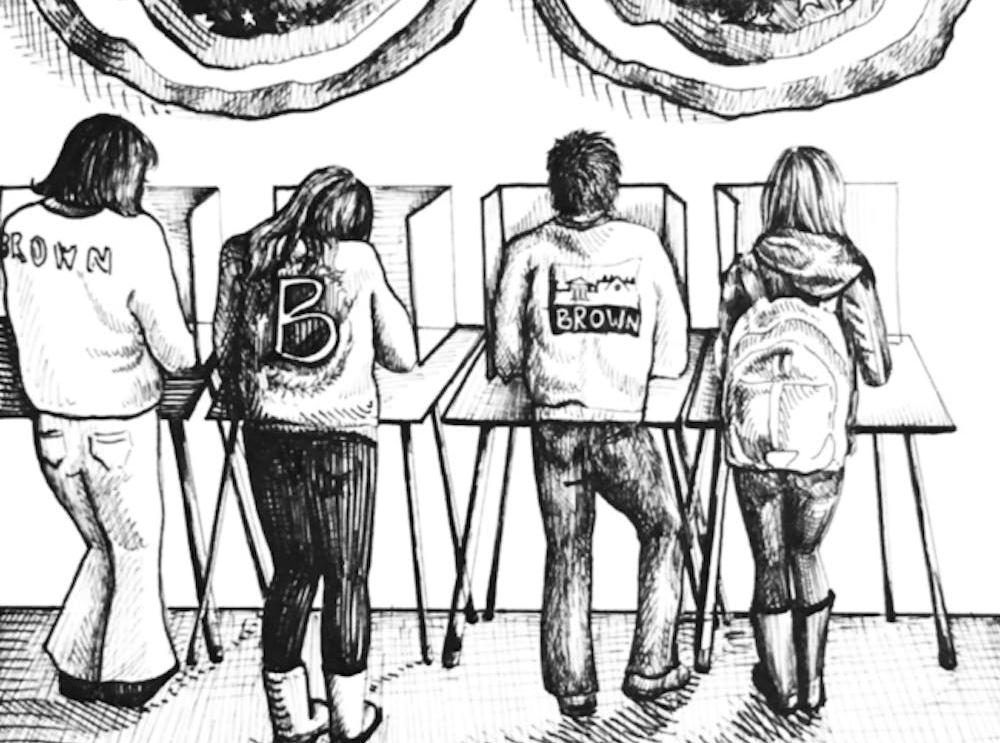
An emotional rollercoaster
For Carter Moyer ’24, election re sults elicited a host of emotions, but
UNIVERSITY NEWS
Group pushes for new SE Asian studies department
toward a proposal with goals that in cluded adding classes in Southeast Asian studies and introducing ten ure-track positions for faculty in the field, The Herald previously reported.


chief among them were “relief and sur prise” at the Democrats’ performance relative to the poor night that had been predicted for the party.
“With the Dobbs decision (which overturned Roe v. Wade), with a lot of threats to Social Security (and) Medi care and just the need to continue to invest in climate, the fact that the Sen ate is still” held by the Democrats “is
BY KAITLYN TORRES AND NEIL MEHTA UNIVERSITY NEWS EDITOR AND SENIOR STAFF WRITERThe Center for Latin American and Caribbean Studies launched a project documenting Rhode Island’s response to George Floyd’s 2020 murder at a showcase hosted at the Digital Schol arship Lab Tuesday afternoon.
“In the Wake of George Floyd: Responses to Anti-Black Racism in Rhode Island” documents how Rhode Island communities re sponded to the aftermath of Floyd’s death along with “broader expe riences of anti-Black racism and police violence,” according to the Watson Institute for International and Public Affairs’ website. The
The event highlighted the proj ect’s multiple components, including a timeline of racial justice activism in the state, a series of analytical essays, a catalog of demonstrations in Rhode Island and a series of interviews with local activists.
In an interview with The Herald, CLACS Director Patsy Lewis, the project’s lead researcher, described the project as “a way to insert Rhode Island into the conversation” of both national and international demon strations related to racial justice in 2020.
CLACS decided to pursue the project after the Office of the Pro vost offered financial support to ac ademic departments and centers at the University that wanted to address systemic racism through their work, Lewis said. According to Jay Rowan, chief of staff to the provost, the of
Prof. Terry-Morgan to retire in June 2023
BY ELIZABETH HIRSCHFELD CONTRIBUTING WRITERThe Southeast Asian Studies Initiative, a student-led project seeking to in crease the representation of Southeast Asia in the University’s curriculum, is pushing for something new: a dedi cated department.
Beyond ongoing advocacy efforts and a campus speaker series, the or ganization is looking to create an official department designated for Southeast Asian studies at the Uni versity, according to SEASI member Ayla Kim ’25.
Kim said that without such a de partment, “you’re missing a whole region of Asia that has a long, rich his tory, has been affected by American imperialism and is up-and-coming in the economy today.”
In 2019, members of SEASI worked
In an email to The Herald, Deputy Dean of the College for the Curric ulum Sydney Skybetter wrote that proposals for new academic programs “must be submitted by voting mem bers of Brown’s faculty (to the College Curriculum Council) with the support of an academic unit, such as a depart ment or institute.”
“Brown offers a number of courses related to Southeast Asia in a range of departments such as archaeolo gy, ethnic studies, history of art and architecture, history, international and public affairs, music and religious studies,” he added. “In addition, the East Asian studies department cur rently offers courses in Vietnamese.”
In the last year, the number of undergraduate courses on South east Asian communities increased from two to 10, according to Kim. The University offered its first Vietnamese language courses in fall 2021, The
BY SOFIA BARNETT SENIOR STAFF WRITERWhen Kathy Moyer, stage and pro duction manager at the Department of Africana Studies and Rites and Reason Theatre, was asked to char acterize her longtime co-worker, the theater’s artistic director Elmo Ter ry-Morgan ’74, three words came to mind.
“Mentor, artist, visionary.”
Terry-Morgan began his time at the University in 1970 and was among the original cohort of students who worked with late Professor George Houston Bass — former personal secretary of Langston Hughes and executor of the poet’s estate. Together, they devel oped the Rites and Reason Theatre, a research and development theater that produces creative works centered around the experiences of members of the African Diaspora.
Following his matriculation from the University, Terry-Morgan stayed in touch with fellow alums and mem
bers of the theater. Over the next two decades, Terry-Morgan frequently com muted back and forth between his home in Greenburgh, N.Y. and Providence to help with theater projects before ultimately joining the University as a professor in 1991.
More than 30 years later, Terry-Mor gan has decided to step back from his role at the theater and will retire from his current position at the University in June 2023. The Herald spoke with Terry-Morgan and several of his col
leagues and students about his time and impact.
“In every moment I’ve spent with” Terry-Morgan, said Eric Gottlieb ’25, a current research assistant at the the ater, “I’ve been impressed by the level of dedication, hard work and genuine enthusiasm he has for his craft.”
Innovating new academics at Brown Terry-Morgan remembers feeling
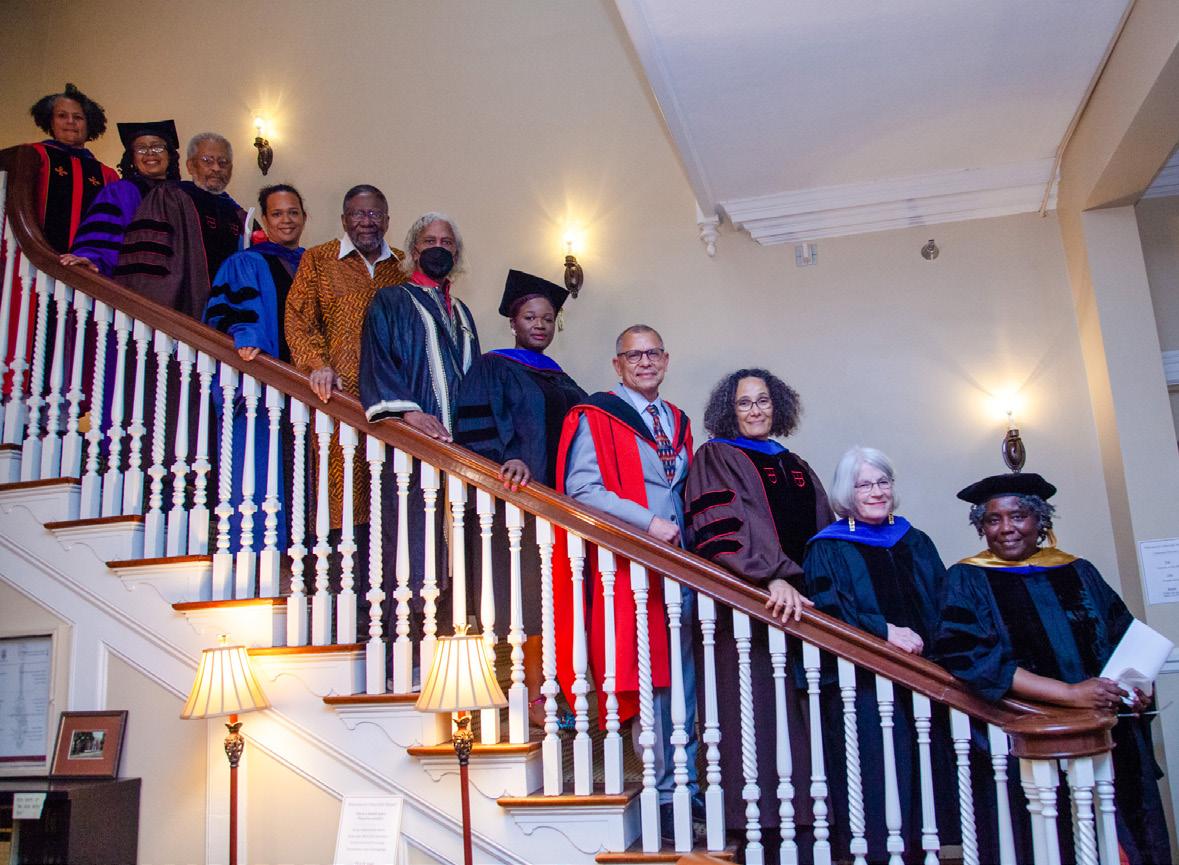
Southeast Asian Studies Initiative looks to make institutional changes
Students say midterms show voters reject extremism, prioritize reproductive rights
‘In the Wake of George Floyd’ seeks to platform community voices, experiences
Colleague, students reflect on Elmo TerryMorgan’s impact, passion for theaterCOURTESY OF KATHY MOYER Elmo Terry-Morgan ’74 created AFRI 0990: “Black Lavender,” which he said was one of his greatest initiatives at the University.
Where are projectile incidents?
BY WILL KUBZANSKY UNIVERSITY NEWS EDITORA Rhode Island School of Design pro fessor was struck by multiple projectiles fired from a car at the corner of Power and Thayer streets Monday afternoon, according to an email from Brown’s Department of Public Safety.
The incident marked the 16th time a Brown or RISD community member has been struck by projectiles from a car since April, The Herald previously reported. The professor did not sus tain injuries from the projectiles, which are “generally small gel balls that are non-toxic and designed for play,” ac cording to the email.
None of the community members who were previously struck have sus tained injuries from the projectiles, Rodney Chatman, vice president for public safety and chief of DPS, previ ously told The Herald.
Chatman previously told The Herald that the incidents are not clustered in certain areas or on specific days of the week. But the department has conducted “investigative efforts” allowing them to identify cars, information that they passed on to Providence’s police department.
A review of “timely warnings” from DPS shows that no incident has taken place north of Bowen Street or south of Power Street. Nine of the 16 incidents have taken place on or between Thayer and Brook streets. Monday’s 6:30 p.m. incident also marked the earliest oc currence this year.
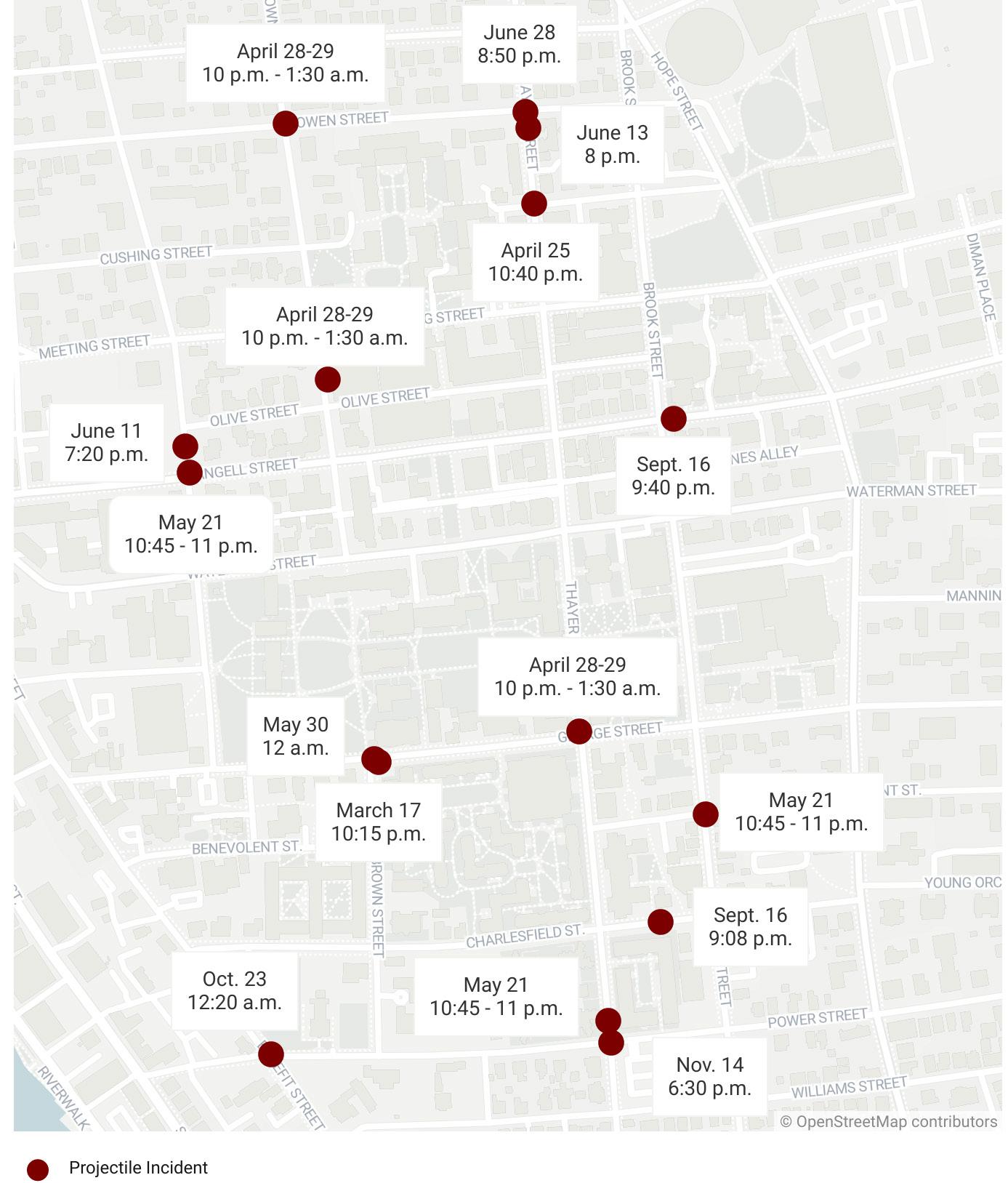
uncertain about whether or not he possessed the necessary credentials to best serve the theater as its artistic director when he was first recruited to join the University in an official capacity in 1991. Despite his personal doubts, he decided to take the position.
Moyer emphasized that Terry-Mor gan was more than qualified for the role. Terry-Morgan “has been a staple (at the theater) in my existence here,” she said.
“He is incredibly creative, talented and a great teacher.”
Jason Tristan Brown ’23, who met Terry-Morgan during his first year at the University, added that Terry-Morgan is a “wise, insightful and … gracious soul.”
As a first-year, “I sat in his TAPS 0100: ‘Playwriting I’ class during shop ping period in a room full of eager up perclassmen with hopes of scoring a spot in his renowned course,” Brown said. “Little did I know, this was the beginning of a beautiful friendship.”
Over the next several years, Brown said Terry-Morgan enriched not just
his academic pursuits, but his personal ones as well.
“As my mentor, (Terry-Morgan) helped me cultivate my skills in creating Afrofuturistic plots in the live theatrical form,” he said. “And as a good friend, (Terry-Morgan) helped me understand how to be an excellent Black man.”
Throughout his career, Terry-Mor gan has specialized in rethinking the ater as both a performance and study.
Terry-Morgan said that one of the most fulfilling projects within his time at the University was the creation of his class AFRI 0990: “Black Lavender: Black Gay/ Lesbian Plays/Dramatic Constructions in the American Theatre,” one of the first courses in the country to explore Black LGBTQ experiences at the uni versity level.
The inspiration for the course came to Terry-Morgan in the early 2000s from multiple students engaged in research projects focused on Black theater and LGBTQ themes.
“I had like six independent studies all working on the same thing and I thought, ‘This makes no sense,’ ” he
said. “Meeting once a week with six different people? Yeah, this is a course.”
Largely through word of mouth, Ter ry-Morgan said that “the course finally started growing.”
For Terry-Morgan, the course was more than a mere area of study. Through partnership with the LGBTQ Center, Terry-Morgan worked on proj ects that sought to amplify Black, queer voices across the world of theater.
“It’s hard for any playwright to put on a production. It’s harder for all Black people,” he said. “I knew that I wanted to do something.”
Archiving Rites and Reason history
Aside from the development of “Black Lavender,” Terry-Morgan cites his efforts to archive the Rites and Reason Theatre as another one of his largest projects at the University.
“I started focusing on (archiving the theater) in the summer of 2011,” Terry-Morgan said. “I saw that we had all of these VHS tapes laying around and I (decided) that we needed to protect them, otherwise one day they’ll all just
crumble.”
“We had to take the old media and digitize it,” he explained.
According to Terry-Morgan, the pro cess was not easy. But with the help of Giovi Gastaldi, associate director of me dia services, the theater slowly started the process of preserving its history.
Media services “has digitized ev erything — every single file so that we can have that backlog of DVDs,” Ter ry-Morgan said.
Terry-Morgan also emphasized the importance of accessibility in his vi sion for the Rites and Reason Theatre archive. “Most of these archives and universities have all of these papers and boxes,” he said. “I didn’t want to give the library a box of tapes and then have them take it and put it in a coffin.”
“I want sort of an online, digital re search archive museum, so that people can go to the Brown websites, click on Africana (studies) and it’ll take you to the archive,” he said. “I wanted that kind of archive that people can discover.”
Terry-Morgan said that he hopes better public engagement will help the
theater move “into a new era.”
Throughout his 30-year tenure at the University, which included numer ous other projects with the Rites and Reason Theatre, Terry-Morgan has earned the reputation of an innovative leader and thinker among his colleagues and students.
Terry-Morgan’s leadership style is “smooth, like making jazz,” Moyer said. “And that means that he adapts to whatever is needed from him in the moment.”
Moyer added that Terry-Morgan holds “a lot of institutional knowledge” that will be challenging to replace.
“We’re looking for the right person to become the new artistic director,” she said. “Somebody who gets the the ater and the importance of its history and the work we do to bring voice to all types of people, with all kinds of backgrounds.”
“Professor Terry-Morgan is the voice of the Rites and Reason Theatre,” Gottlieb said. “He’s one of the people I admire most at Brown. I’m very grateful to have had the chance to work for him.”
RISD professor struck by projectiles Monday afternoon, says DPS email to campusWILL KUBZANSKY AND GAYA GUPTA / HERALD TERRY-MORGAN FROM PAGE 1
Jennifer Lawrence stuns in tastefully minimalistic ‘Causeway’
BY RYA VALLABHANENI SENIOR STAFF WRITERIn a cinematic landscape increasingly focused on aesthetics, a film that opts for minimalism stands out. A disregard for flashy sets, fast action and shock value may seem counter productive when seeking to capture an audience’s immediate attention. But if done well, simplicity can be extremely effective. Lila Neugebau er’s “Causeway” deftly demonstrates the power of simplicity, proving that a film does not need to excessively pack in action in order to move its audience.
“Causeway” stars Jennifer Law rence as Lynsey, an American sol dier suffering from post-traumatic stress disorder and depression. After a traumatic brain injury in Afghani stan, Lynsey is discharged to recover. Shortly after the film begins, viewers watch her leave rehab, but it soon becomes apparent that her mind not yet settled. Lynsey seems removed and somber — present physically but not yet mentally. She struggles to maintain complete control over her body. What’s more, she feels confined living with her mother (Linda Emond) in her childhood home. After Lynsey’s car breaks down, it is only a matter of time before she does as well.

Still, Lynsey is unwaveringly in sistent that she is “fine.” She takes a job maintaining pools but views the position as only temporary. Her plan, against the advice of both her mother and doctor (Stephen McKinley Hender son), is to apply for redeployment once her health permits it.
Early in the film, Lynsey meets and immediately connects with James Au coin (Brian Tyree Henry). Although he is the mechanic fixing her car, their relationship moves well beyond strict ly professional. Before long, James is driving Lynsey to her doctor’s appoint ments and buying her snow cones, eventually asking her to move in with him. But as their relationship develops, Lynsey retreats from him, as she does with all of the people in her life. She empathizes with his own trauma, a car accident which resulted in the loss of one of his legs, but simultaneously pities him.
Keeping with the pacing of the rest of the film, there is no singu lar impetus for Lynsey and James to reconcile. Instead, it is time and reflection that change both of their minds, just as it is time and reflection that direct the entire thematic course of the movie. The film’s climactic moments consist of long-overdue expressions of vulnerability between characters, but even in these scenes, dialogue and background music re main sparse. The focus instead is on the characters’ connection — how they inhale, look at each other and finally share what they know should have been said earlier.

Fittingly, one of the most emotional
scenes of the entire film has almost no dialogue in it whatsoever. Only Lynsey and her brother (Russell Harvard) ap pear on screen, and she looks at him from the other side of a glass divider as she visits him in prison. Their entire conversation is in sign language, and so the scene instead relies on sighs, soft chuckles and suppressed tears, rather than spoken words. It is a testament to the modesty of the film, in which even the sounds of language are deemed unnecessary to elicit strong emotion.
Lawrence’s casting for this role makes perfect sense given her often
subtle acting style. As a result, she em bodies the role of Lynsey seamlessly. There are several shots of her simply standing at the edge of a calm pool, moments that capture her character’s all-encompassing stillness. It is perhaps during these moments that Lawrence is at her best in the film, communicat ing everything while saying absolutely nothing at all.
Henry is similarly impressive. He is more talkative than Lawrence, but such is his role in the film: Though he struggles with his own trauma, he is more forthcoming. The two balance
each other beautifully.
Although “Causeway” does not nec essarily fit into the current stream of popular cinematic culture, it is still valuable as a work of art. Neugebauer has made both a bold and admirable decision in directing with such mini malism. The film will likely not be up for an Oscar, nor is it going to make considerable waves on social media. But such standards do not detract from its ability to leave audiences emotion ally satisfied. “Causeway” lets viewers walk away content, needing nothing more.
Viewers watch Lawrence grapple with PTSD as young veteranCOURTESY OF APPLE TV+
huge,” Moyer said.
Jay Philbrick ’24.5 echoed similar sentiments, saying he felt “happy and surprised” at the election results.
“There was a lot of doom and gloom in the press. There were a huge amount of predictions about a red wave,” Phil brick said. “Come election night and a couple days after, I think it was a huge success.”
Julian Coss Y Leon Cronin ’25, trea surer of the Brown College Democrats, said the midterms’ results brought joy and relief.
“I’ve been very concerned about the direction our country was going in politically, and I thought that Tuesday demonstrated that Americans reject radical extremism and uphold democ racy, and that the economic winds of the current day will not push Amer icans into the hands of extremism,” Cronin said.
Philbrick said that Democrats win ning the Senate — news that broke several days after Tuesday’s midterms — was a “huge accomplishment” for the party.
“We’ll be able to confirm more judges (and) do any cabinet reshuffles
… (which) will really be huge for the administration and for the country,” Philbrick said.
The red wave that never was Jack Wolfsohn ’23, president of the Brown College Republicans, blamed former President Donald Trump for the Republican Party’s failure to meet expectations on election night.
“Overall, it was a terrible night for Republicans — it was a disaster,” Wolfsohn said. “I think the blame can simply be put on Trump for that. Trump handpicked these very bad candidates for governor and for Senate — and even the House as well.”
Wolfsohn said that some of these hand-picked candidates “came across as crazy,” citing the “ridiculous” fact that many of them denied the validity of the 2020 presidential election results.
“They seem to be Trump’s lap dogs, and to be doing whatever (Trump) told them to do … rather than focusing on what voters in their districts or in their states wanted them to do,” he added.
Moyer argued that defining the night as a win for the Democrats is hardly partisan: Some members of the GOP are labeling the midterms a disas ter for Republicans.
“If you hear the rhetoric coming out of the mouths of right-wing me dia, they deem it a total loss,” Moyer said. “The Republicans really thought they were going to win big, and that was also their messaging. When your messaging is like that, when the histor ical trends are like that and it doesn’t play out, that’s showing that there’s something really seismic happening in the country.”
Wolfsohn said that even the Repub licans’ probable control of the House isn’t entirely positive considering the slim majority they’re likely to gain.
“With the fact that the Senate (has gone) to the Democrats, Republicans can’t stop Biden’s judicial nominees; but at least if they control the House, they can hamstring Biden’s legislative agenda, which is in my opinion good,” Wolfsohn said. “But the majority was supposed to be far more.”
While experts have examined sever al potential reasons for the improbable success of Democrats on election night, Philbrick highlighted reproductive rights as an issue that turned the tide of the midterms.
Moyer argued that a surge in women who registered to vote, as well as de feats of anti-abortion ballot measures
in conservative-leaning states such as Kentucky, showed that reproductive rights animated voters in the midterms.
Wolfsohn also pointed to repro ductive rights as a major area that led Republicans to lose ground in the midterms. He said that while polls sug gested that abortion wouldn’t be a de ciding factor in the elections, exit polls showed that the impact of abortion was far greater than anticipated.
Is the American electorate taking a stand against extremism?
Tuesday night was about more than any individual candidate or race, ac cording to Wolfsohn. It was a sign of changing tides in the American elec torate: a turn away from political ex tremism and Trump, he said.
“The American electorate real ly wants not extreme candidates,” Wolfsohn said. “They want … people who believe in conservative policy ideas and are not necessarily completely loyal to Trump.”
Wolfsohn said a turn towards polit ical moderation makes the perfect case for Florida Governor Ron DeSantis to be the future of the GOP.
“Ron DeSantis won by 1.5 million votes, Florida went completely red and
it just shows that Ron DeSantis is an actual leader who gets things done,” Wolfsohn said. “He doesn’t have all the baggage that Trump has and he’s a lot more likable to voters.”
Moyer said the election results also represent a shift in voting power to younger demographics.
Moyer pointed to how the 18- to 29-year-old age group gave Democrats a boost. “That should really tell Demo crats where this country is moving and where power is,” he said.
In light of that trend, Moyer said Democrats will have to ensure they’re targeting the issues young voters care about: “abortion, young people and the economy.”
Philbrick predicted that the GOP will have to “do a lot of soul-searching” in light of the midterm results.
“Take the hint, stop trying to chal lenge the election, stop trying to relit igate things, start believing in democ racy and start believing in fighting for working people,” Philbrick said. “I think it’d be a good thing for the country if Republicans reflect more on this elec tion and realize why they lost when … they should have had an easy election, and they really shot themselves in the foot.”
TODAY’S EVENTS
Richard Wright Papers: Exploring the Art of Black Confession 12 p.m. 70 Brown St., Barket Room 315
Women in Public Health Network Event 12 p.m.
School of Public Health, Room 245
TOMORROW’S EVENTS
What You “KNEAD” to Know About Study Abroad 9 a.m.
Page-Robinson Hall
Free Professional LinkedIn Headshots 10 a.m.
Kasper Multipurpose Room
Data Seminar with Prof. Jona than Pober 4 p.m. 164 Angell St.
Silencing Journalism 5:30 p.m.
Watson Institute, True North Room
Condensed Matter Seminar with Prof. Steve Johnston 4 p.m.
Barus and Holley, Room 190
“TROY!” Movie Night at the Joukowsky Institute 6:30 p.m.
Rhode Island Hall, Room 108
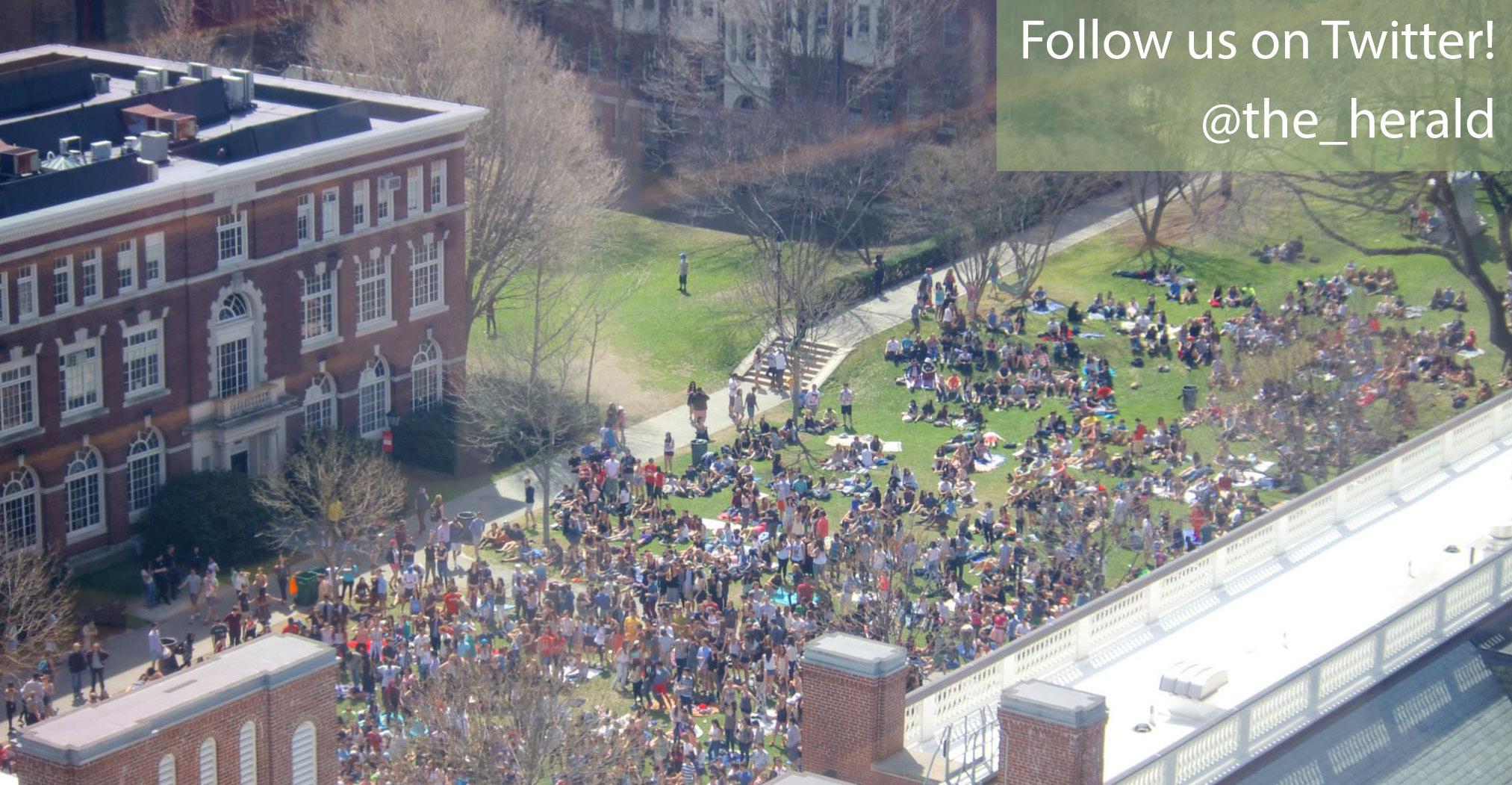
fice funded several proposals related to racial justice through the Addressing Systemic Racism Fund, part of Brown’s response to Floyd’s killing.

At the event, Black Lives Matter Rhode Island Political Action Commit tee Director Harrison Tuttle — one of the activists interviewed for the project — said that getting involved with the project was “incredibly important” to maintain momentum surrounding ra cial justice activism.
The project was shaped by public reactions to Floyd’s death, Lewis said.
“Why did (Floyd’s death) resonate with people’s specific experiences?” Lewis said. “What does it tell us about the resonances between people’s expe riences with the state and the police, and why do they connect to George Floyd?”
Several University students, includ ing Isabella Garo ’24 and Niyoshi Parekh ’22.5, were involved in collecting data and developing the project.

Garo hopes that “this project demonstrates that grassroots move ments can have real impacts,” she wrote in an email to The Herald. “Ideally, this project will boost the voices of the peo ple of Rhode Island, reminding their government that real, systemic change is popular and necessary.”
Both Parekh and Garo noted CLACS’s welcoming environment.
“My experience at CLACS was amaz ing,” Garo wrote. “My coworkers were all extremely kind, intelligent and pas sionate, and I am very grateful that my first-ever research job could be with such a group of people.”
“Everyone was very welcoming and passionate about the project,” Parekh added.
Lewis said that members wanted the project’s layout to be easily acces sible, featuring community members’ personal experiences.
Both Lewis and Tuttle described challenges associated with engaging
activists and Rhode Island residents during the project.
When reaching out to community activists, Lewis said that some people were skeptical about speaking to proj ect members. “When you engage with people outside of academia, they want to know that they’re not just fodder for your work,” she said.
Tuttle added that although activists like him are working to promote racial justice “all the time,” the general pub lic and media will often “only react to reactionary events of police brutality or outrage.”
Lewis hopes that making a digital project, rather than a report “on a shelf that people won’t read,” will provide
“teaching tools” to the community. The center’s project helps “keep the memory of these (protests) alive,” Lewis said. Responses to Floyd’s death won’t “just fade as if there’s no record.”
This project is “creating history,” Lewis said. “It’s creating oral history and putting it in an easily accessible place.”
Rhode Island roundup: Homelessness increased since 2021, report says
RI Life Index suggests declining quality of life;
Seth Magaziner visits
Washington, D.C.
BY KATY PICKENS METRO EDITORHomelessness higher than last year
In light of concerns about increas ing state-wide homelessness with the approach of winter, the Rhode Island Coalition to End Homelessness hosted a presentation of its annual “State of Homelessness” report Nov. 14.
Each year, the coalition conducts a point-in-time count of how many peo ple are experiencing homelessness on a single night in Rhode Island. According to a count from Jan. 26, 1,577 Rhode Islanders were unhoused.
Samantha Burnett, community pro grams engagement coordinator for the coalition, presented her personal expe riences with homelessness and domes tic abuse, as well as the importance of working to address homelessness in the state.
R.I. Secretary of Housing Josh Saal ’09 also spoke during the meeting. Homelessness is “a sign of our failure as a society to make the right interven tions and help (people) out, our failure as neighbors, our failure as a commu nity,” Saal said, according to UpriseRI.
Rhode Island trending down on many quality-of-life standards
The Rhode Island Life Index 2022, presented by Blue Cross & Blue Shield of Rhode Island and the School of Public Health, was released Nov. 14, the Boston Globe reported.
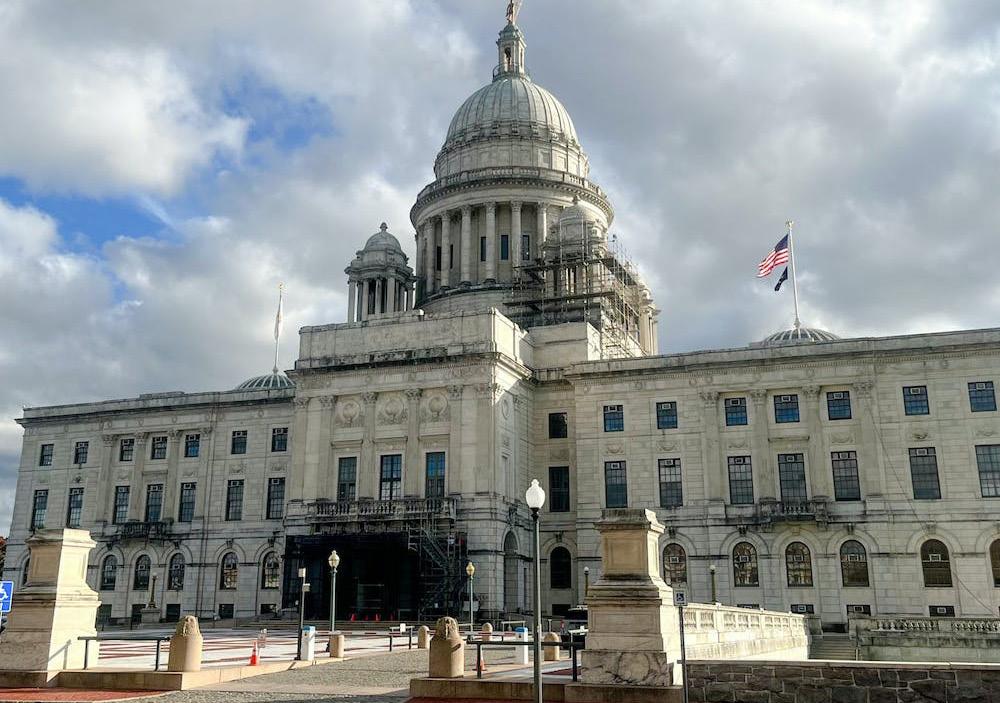
“In 2022, perceptions trended down
in several areas,” according to the re port, which detailed whether Rhode Islanders felt their needs were being met. The report found that “access to affordable housing, childcare and ac tivities for youth, quality education, affordable and nutritious food, good jobs, medical care, programs for seniors, transportation services, feeling safe at home and cost of living trended down for most Rhode Islanders.”
Scores in individual quality-of-life categories are calculated based on a survey distributed to Rhode Islanders.
Affordable housing notably scored low, earning 33 out of 100, while food security garnered a score of 80.

“By shining a light on gaps in basic needs through the R.I. Life Index, we can create a shared agenda with the community to address these gaps,” Mar tha Wofford, Blue Cross & Blue Shield of Rhode Island president and CEO, told the Boston Globe.
The state received an overall score of 59 from Ocean State residents.
Magaziner travels to Washington,
D.C., for congressional orientation
Seth Magaziner ’06, Democratic state treasurer, clinched Rhode Island’s 2nd Congressional District seat in the House of Representatives last week, defeating Republican Allan Fung Nov. 8, The Herald previously reported.
Magaziner has already visited the U.S. Capitol to begin congressional orientation.
“Just finishing up our first day of orientation,” Magaziner said in a video posted to his Twitter. “A big thank you once again to the people of Rhode Island
for putting your trust in me and to all of our staff and volunteers who got us here.”
He added that he had spoken to sev eral representatives who cited the Jan. 6 insurrection as their motivation for running and emphasized the need to respect the results of elections.
“I hope that as the last few races are being called and the results are be ing counted that everyone honors the results — win or lose — and that our democracy continues to endure and thrive going forward,” Magaziner said in the video.
Submissions: The Brown Daily Herald publishes submissions in the form of op-eds and letters to the editor. Op-eds are typically between 750 and 1000 words, though we will consider submissions between 500 and 1200 words. Letters to the editor should be around 250 words. While letters to the editor respond to an article or column that has appeared in The Herald, op-eds usually prompt new discussions on campus or frame new arguments about current discourse.
All submissions to The Herald cannot have been previously published elsewhere (in print or online — including personal blogs and social media), and they must be exclusive to The Herald.
Submissions must include no more than two individual authors. If there are more than two original authors, The Herald can acknowledge the authors in a statement at the end of the letter or oped, but the byline can only include up to two names. The Herald will not publish submissions authored by groups. The Herald does not publish anonymous submissions. If you feel your circumstances prevent you from submitting an op-ed or letter with your name, please email herald@ browndailyherald.com to explain your situation.

You can submit op-eds to opinions@browndailyherald.com and letters to letters@browndailyherald. com. When you email your submission, please include (1) your full name, (2) an evening or mobile phone number in case your submission is chosen for publication and (3) any affiliation with Brown University or any institution or organization relevant to the content of your submission.
Please send
The Brown Daily Herald, Inc. is a financially independent, nonprofit media organization bringing you The Brown Daily Herald and Post- Magazine. The Brown Daily Herald has served the Brown University community daily since 1891. It is published Monday through Friday during the academic year, excluding vacations, once during Commencement and once during Orientation by The Brown Daily Herald, Inc. Single copy free for each member of the community. Subscription prices: $200 one year daily, $100 one semester daily.
Sender ’25: In support of taxing colleges and universities
Across the country, private universities are gen erally exempt from federal taxes and are clas sified as nonprofit institutions, often referred to by the statute that defines them: 501(c) (3). States generally follow the standard set by the federal government and also allow private universities to avoid taxes on their holdings — Rhode Island is no exception. Tax-exempt sta tus is enjoyed by private universities because it is assumed that they do not collect tuition and grow their endowments for the sake of private profit, but rather to provide for their students. More significantly, these institutions are sup posed to be mission-driven and furnish an es sential product: an educated citizenry necessary to sustain American democracy and maintain the country’s economic competitiveness. Thus, it has been reasoned, the imposition of taxes would only serve to hinder universities’ abili ty to provide these services for the American populace. However, this is not the case. Private colleges and universities should be taxed in or der to properly account for their impact on sur rounding communities — and passage of legis lation in Rhode Island could serve as a catalyst for this movement.
Two major issues emerge with the common explanation for universities’ tax-exempt status. The first is that it is unclear whether a college actually creates more public good than other investments or purchases. Is it really the case that the students educated at universities pro vide critical support for American democracy that they could not provide if the universities’ endowments were taxed? A cursory examina tion would suggest otherwise. The benefits of a degree are experienced most strongly among those from higher income brackets, casting doubt on the idea that college is a positive for everyone, let alone those who don’t attend in the first place. Relatedly, receiving a college degree has been likened to buying a home: It ensures prosperity for certain holders, but has
murky benefits for society. Sure, colleges cre ate jobs in themselves and can generate re search that can help those around the world. But a blanket tax-exempt policy implies that the basic product colleges offer — degrees — is valuable on its own. We should not expect that everyone must get a college degree to add to American society. Someone with a high
fire protection while the university pays no tax es to support them. As a result, these universi ties leave the cities they inhabit in fiscally dire straits, forcing them to find ways to provide services when large portions of the land they would use to pay for it are not able to be taxed. And, often, schools are hit first in local budget cuts.
Currently, the city of Providence receives pay ments in lieu of taxes from local colleges, which amount to $7.2 million in total. But if H7956 were to be passed and the city could tax univer sity land, Providence would likely receive more than $80 million from its various colleges and universities in property taxes. The implementa tion of this bill would increase the revenue from universities to the city tenfold and increase the city budget by something like 14%. It goes with out saying that such an enormous infusion of cash to the city would allow it to produce tan gible changes for its residents, especially its young students. If H7813 is also passed and the city is allowed to tax endowments, schools in the city would immediately see an additional $155 million in funding, a dramatically impact ful sum for grossly underfunded Providence public schools.
school diploma can just as easily engage with the American political process or economy as someone with a college degree, even if a degree may bring its holder a greater level of fluency in some of the more esoteric and complex of soci ety’s processes. In short, we’re giving colleges too much credit.
In addition to producing predominantly pri vate benefits, universities are also abusing their tax-exempt status to wreak havoc on munici pal revenue streams. In many cities and towns across the country, universities are often some of the largest landlords in the area. With prima ry and secondary school funding being largely derived from local and state property taxes, the tax-exempt status of these universities leaves huge holes in school budgets. On top of this, localities often must still provide services for the university, including road and electrical maintenance, snow removal, trash pickup and
Rhode Island lawmakers have recognized this issue for some time, but this past year has seen important progress in redressing it. Three bills currently under review in the Rhode Island General Assembly aim to solve this problem: H7956, H7813 and S2600. At their core, these bills would allow localities to tax the property owned by these colleges or their endowments. H7956 and S2600 would allow for the taxation of university property, and H7813 would allow for a locality to tax up to 2% of a university’s endowment to fund local public schools.
The benefit these bills would bring to Rhode Island cannot be overstated. Take Providence, where nearly 40% of all land in the city is tax-exempt, partially because of the large sums owned by Brown, the Rhode Island School of Design, Providence College and Johnson and Wales University, with Brown being the larg est institutional landowner in the entire city.
Universities should be for the public good. Ultimately, institutions of higher education, particularly those in Providence, can either pre serve their tax-exempt status or fulfill that mis sion. Preserving tax-exempt status means con tinuing to expand university influence across the city, further shrinking the tax base and harming the educational opportunities of more and more public school students. If Rhode Is land colleges relinquish their tax-exempt status and pay their fair share, they will do far more to educate students and preserve American de mocracy than they can claim to do right now. Education is the surest path to opportunity to day, and universities can provide education to far more than their own students by giving up their tax-exempt status.
Gabe Sender ’25 can be reached at gabriel_ sender@brown.edu. Please send responses to this opinion to letters@browndailyherald. com and other op-eds to opinions@brown dailyherald.com.
Brown’s chronic lack of countervailing view points both within the student body and among faculty is unbecoming of an institution suppos edly committed to diversity and inclusion.
Put differently, it is difficult to under stand how students could possibly receive a well-rounded education at Brown when the Col lege’s faculty and student body are almost all in ideological lockstep with one another. Just as it is the mark of an educated mind to be able to entertain a contrarian thought without accept ing it, a serious university must earnestly con tend with heterodox views without caricaturing or condescending them. The often-cited Kalven Report from The University of Chicago, a docu ment affirming the value of academic freedom and universities’ neutrality on political issues, encapsulated this pedagogical imperative when it succinctly clarified that: “In brief, a good uni versity, like Socrates, will be upsetting.” John Stuart Mill also famously touched on this point in the second chapter of his book “On Liberty,” when he asserted that “however true (a popular or strongly held opinion) may be, if it is not ful ly, frequently and fearlessly discussed, it will be held as a dead dogma, not a living truth.”
Adding further testimony to the significance of intellectual diversity, the celebrated Brown Professor Alexander Meiklejohn was wise to note that citizens can only make the best deci sions for themselves and for their communities when they are provided with a variety of view points, enabling the most inclusive and disposi tive public deliberation. Using Meiklejohn’s log ic, it follows that students deserve to be exposed to as broad of a range of relevant perspectives as possible, so that they may make well-informed decisions — both on College Hill and beyond.
But there is no such broad range of politi cal views at Brown. The overwhelming majority of the student body identifies as left-leaning. And when it comes to the faculty, there are only
a handful of libertarians or conservatives, and hardly any of them are outspoken. Sure, John Tomasi, whose research and writing concern libertarian ideology, held views markedly dif ferent from the liberal consensus on campus, advocating for free speech on campus for the 27 years he taught at Brown before leaving to lead the Heterodox Academy. And I give Professor
es, hires like Calabresi would give rise to new course offerings that would expose students to viewpoints they might not otherwise encoun ter during their four years on College Hill. This change would also enable the possibility of a right-leaning academic advisor who could at tend to the nuanced needs of ideological outli ers on campus who do not identify with Brown’s
recent research and publicly available work. At best, sustained faculty engagement in debate could earn them praise from the Brown commu nity for their candid willingness to defend their positions in front of a live audience.
Thirdly, the Office of Admission ought to make a transparent and concerted effort to in crease outreach to applicant pools likely to contain top-caliber candidates from less main stream educational backgrounds — who tend to be more conservative. Put differently, Brown should aim to compose an incoming class that is not only racially, socioeconomically and geo graphically diverse, but also ideologically di verse. This change would benefit the entire institution, but especially the liberal majori ty of students who are currently robbed of the valuable opportunity to have their arguments stress-tested (and ultimately fortified) by op posing perspectives.
of Economics and Social Sciences Glenn Loury full credit for bravely and vehemently speaking against affirmative action as a Black conserva tive. That said, it will take far more than one outspoken economics professor to balance out Brown’s lopsided academic culture and reduce its susceptibility to unreflective groupthink.
Here are three actionable remedies the Uni versity can pursue to mitigate this problem.
First and foremost, it is imperative that Brown seeks out some esteemed conservative and libertarian faculty members to hire in order to diversify the teaching and curriculum offered by the College. Former Visiting Professor of Political Theory Steven Calabresi, who (among many other things) clerked for the late Jus tice Antonin Scalia on the U.S. Supreme Court, epitomizes the type of scholar Brown should focus on attracting. Particularly in the depart ments within the humanities and social scienc
culture of political progressivism. Lastly, this change would unlock research possibilities and theses that are more suited for nonconformists — and render such opportunities far more acces sible than they are to so-called outliers today.
Secondly, the College faculty ought to co operate more with student organizations from across the political spectrum, such as the Brown Federalist Society, to help it achieve its mission of sponsoring fair, balanced and open campus debate with dissenting guest speakers. This is especially needed with respect to conservative speakers, who — according to a 2017 analysis by SPEAK, a Brown student group seeking to bring politically diverse speakers to campus — are much less likely to otherwise be invited to speak on College Hill. This should not be taboo. At the very least, participation in civil discourse with such guests provides Brown faculty opportuni ties to clarify positions they have taken in their
The implementation of these three changes would signal to the rest of the world that Brown truly embraces diversity and inclusion, and fur thermore, that it is authentically committed to academic excellence — which can only be main tained via fostering a vigorous debate culture. The choice is entirely Brown’s. Will the Univer sity administration secure a promising future by reaffirming its founding pedagogical principles and reminding everyone of its original mission? Or will Brown resist any such revamping and remain an echo chamber that is likely to intensi fy? Time will tell.
Thomas Bickel ’22 is the founder of the Brown Federalist Society. He can be reached at thomas_bickel@alumni.brown.edu. Please send responses to this opinion to let ters@browndailyherald.com and other opeds to opinions@browndailyherald.com.
“Private colleges and universities should be taxed in order to properly account for their impact on surrounding communities.”
Bickel ’22: U. must take concrete steps to foster intellectual diversity
“Brown should aim to compose an incoming class that is not only racially, socioeconomically and geographically diverse, but also ideologically diverse.”
Six performances, exhibits to check out in Providence this month
Dickens, ‘Soul Tapes,’ ‘Les Misérables,’ diverse art exhibitions currently on view
BY AALIA JAGWANI ARTS & CULTURE EDITORBetween modern takes on classic plays and exhibits centering Black and Indig enous voices, the Providence arts scene has a busy month ahead. The Herald has compiled a list of events bringing arts and culture to the heart of the Ocean State in the coming weeks.
Trinity Rep’s Annual Revival of “A Christmas Carol”
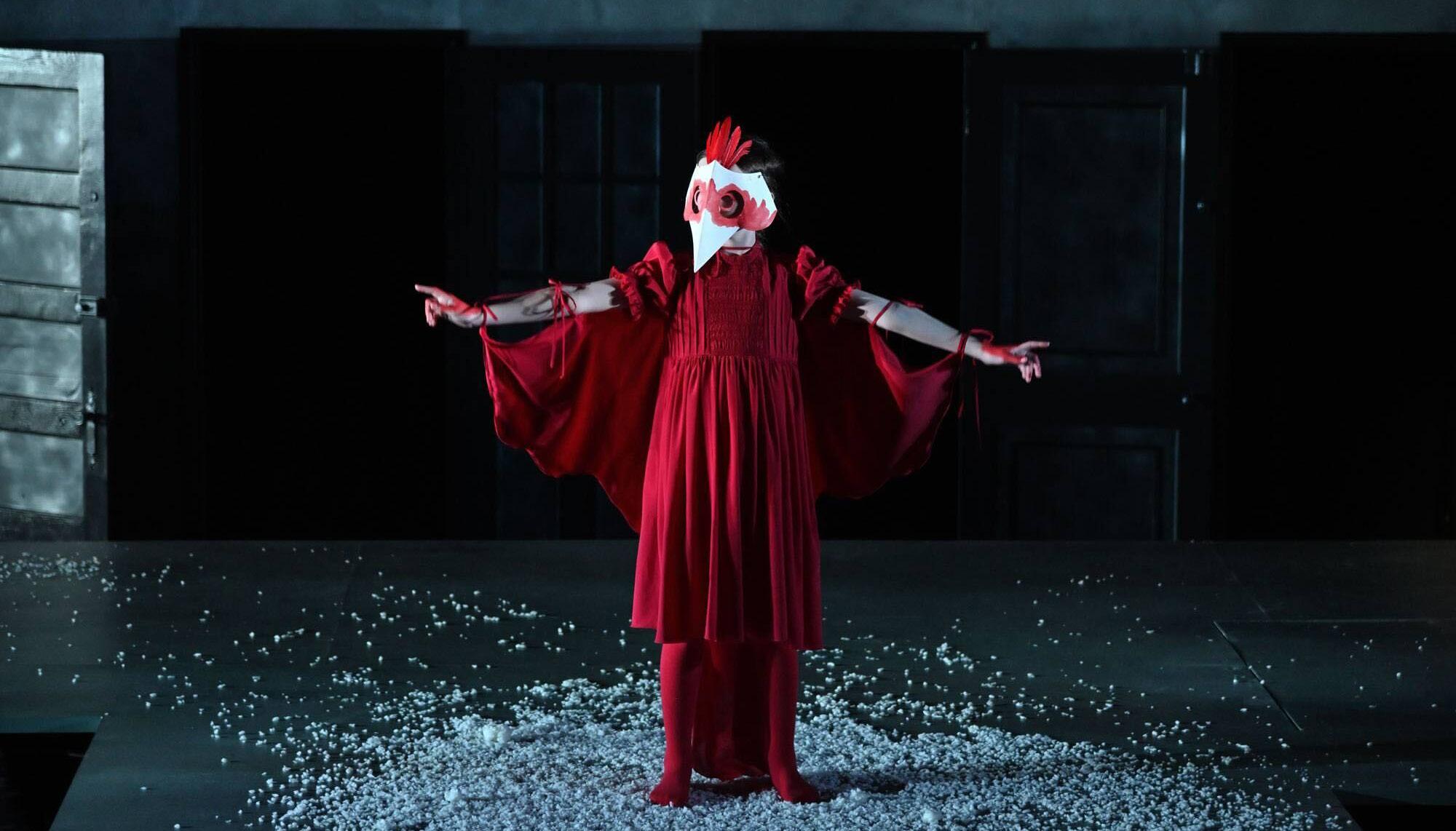
Every year, Providence theater company Trinity Repertory brings the Charles Dickens holiday classic “A Christmas Carol” to life. Its 46th annual production is running for the holiday season through Jan. 1 at Trinity Rep’s Chace Theatre. This year, the produc tion was directed by Aileen McGroddy MFA’21 and stars several Brown/Trinity Rep MFA students.
“Soul
Tapes” with Brown/Trinity Rep’s
MFA Programs
The Brown University/Trinity Repertory Company’s MFA Pro grams in Acting and Directing are presenting a “brand new” production, “Soul Tapes.” The play is directed and written by directing student JaMario Stills, adapted from “The Soul Tapes of Black Folk” by Will Johnson. It is “a celebration of Black being through the ages,” according to the company website.
The play is running through Nov. 20 at the Pell Chafee Performance Center.
“Les Misérables,” Providence Per
forming Arts Center
Providence Performing Arts Cen ter’s production of the Tony-award winning musical “Les Misérables” is running from Nov. 15 to 20. Producer Cameron Mackintosh’s production of the classic has been widely acclaimed for its “brilliant staging,” among oth er things. The show is part of the Performing Arts Center’s “Encore Series.”
“Decoys and Effigies” by Jason Tra vers
Providence welcomes a new ex hibit by artist Jason Travers, opening Nov. 17 and running through Dec.
9. The exhibit will be on display at the Chazan Gallery at the Wheeler School. Travers teaches drawing at Rhode Island College and art history at Anna Maria College. Through his paintings, Travers “seek(s) a deep visual connection rooted in Romantic impulses that began in 19th Century experience,” according to the gallery website.
“Perceptions of Organizational Change, through a Kaleidoscopic Lexicon of Color”
The John Nicholas Brown Center exhibit “Perceptions of Organiza tional Change” is on display in the
Nightingale-Brown House until Dec. 22. It is a culmination of Rhode Is land-based artist Deborah Spears Moorehead’s residency, responding to the Center for Public Humanities’ wallpaper, “Les Vues d’Amérique du Nord,” which has been criticized for its depiction of Black and Indige nous peoples. Spears Moorehead created four large panels that draw on her Seaconke, Pokanoket and Wampanoag ancestry to respond to the “inaccurate and false depictions of Indigenous people” in the 1835 French wallpaper, according to the event description.
The Pembroke Center for Teaching and Research on Women is hosting a new exhibition, “Hortense J. Spillers: A Life Recorded,” displaying the personal and professional papers of renowned Black feminist Hortense J. Spillers. Her work focuses on the intersectionality of “race, gender, psychoanalysis, Black culture and sexuality in literature,” according to the Pembroke website. The documents include her personal diary and correspondence from Toni Morrison.
The exhibit will be on display week days through Dec. 21.
To raise awareness of Southeast Asian studies, SEASI has brought fac ulty lecturers from other institutions to speak on campus, Kim added.
“I very much appreciate the activ ism,” said Daniel Ibarra, professor of earth, environmental and planetary sciences and environment and society.
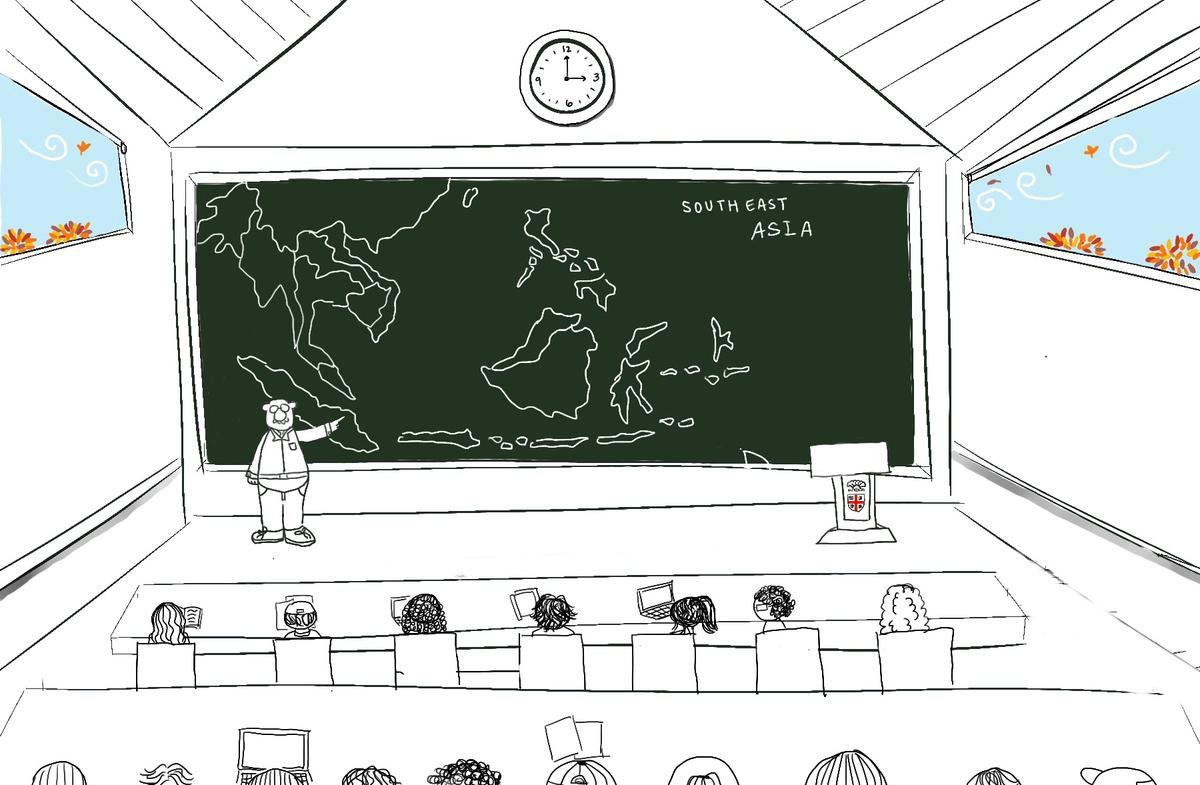
Ibarra is Filipino American and does fieldwork in Southeast Asia, predomi nantly in the Philippines. He plans to co-teach a course next academic year on the history of climate studies with a focus on East Asia and Southeast Asia, he said.
Ibarra noted that he views the study of Southeast Asia as distinct from the study of East Asia. “The history, lan guage and culture of Southeast Asia is fairly different (from) that of East Asia,” he said.
Ibarra added that SEASI’s goal of creating a new department faces lo gistical hurdles. “Academia is a slow process, and students would like it to be fast. Going from an initiative to an institute or department is a really big step that requires a lot of backing from a lot of stakeholders,” he said. “It requires significant investment from donors or the University choosing to use its en dowment.”
Despite these logistical challeng es, Ibarra still supports SEASI and its mission. “It’s a way for the students
to push the faculty and the upper ad ministration to think: How can we not just be a local university, but how can we expand our global impact?” he said.
For Kim, the group “being imple
mented in the first place — having a collective body of students who are pri marily from the Southeast Asian region (who) have come together because they want to see themselves, their families,
their lineages (and) their cultures rep resented, studied and acknowledged in academia” is one of SEASI’s greatest achievements, she said.
“The fact that we established this
club in the first place shows that there’s real initiative to have more represen tation,” she added. “I’m just thankful that we even have this space and this group to begin with.”
